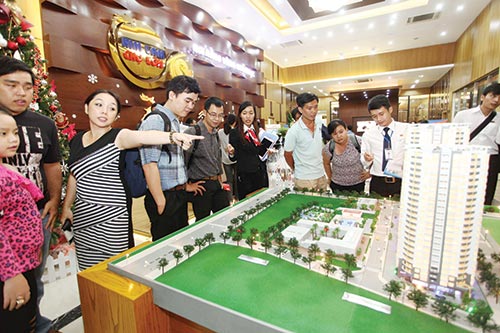Remittances to help thaw the residential market

Apartment projects have seen particularly high sales recently Photo: Le Toan
In a recent survey by Vietnam’s Central Institute for Economic Management it is predicted that money from abroad could reach $12 billion in 2014, peaking in January and February due to Lunar New Year celebrations. Money from the US accounted for 57 per cent of inbound remittances, followed by Australia and Canada. Recently, money flows have also come from Asia where there are a high number of Vietnamese workers, such as Malaysia and Taiwan.
Phan Huy Khang, CEO of Sacombank revealed the bank transferred $2 billion worth of remittances in 2014, up 15 per cent on 2013.
Dong A Money Transfer CEO Tran Van Trung was also upbeat as the company received 10 per cent more remittances in 2014.
State Bank of Vietnam officials attributed the growth to a better macroeconomic environment, including a slow inflation rate and positive economic growth
Banking expert Nguyen Tri Hieu estimated that 30 per cent of Vietnam-bound overseas money would be funnelled into real estate.
Vu Cuong Quyet, CEO of the Northern Green Land Real Estate and Services Joint Stock Company, told VIR, “the end of the year is always the busiest time for house purchasing. Remittances will certainly be a great source for real estate investment, which has long been a favourite long-term investment channel among Vietnamese.”
Representatives from Dong A Money Transfer echoed this view, telling VIR that with decreasing prices for properties, real estate may regain its attractiveness to remittances holders.
Khang explained the surge, “I believe that the new law easing rights for overseas Vietnamese to buy properties in Vietnam is the main reason. If buying procedures become seamless, more remittances will pour into real estate.”
According to the drastically amended Housing Law, starting from July 2015, foreigners and overseas Vietnamese will be allowed to purchase, lease, transfer or sell houses in Vietnam. They can also use these properties as collateral, but they will only have a maximum 50 year ownership.
In its recent report, Grant Thornton Private Equity Investment Vietnam regarded this move as a much needed boost to the Vietnamese real estate market.
Another reason for this growth are falling bank interest rates, coupled with stable exchange rates between the US dollar and Vietnam dong. This has discouraged deposits. Moreover, according to Trung, the domestic stock market was highly volatile in 2014, losing favour with remittance receivers. As a result, they are looking to invest in real estate instead.
What the stars mean:
★ Poor ★ ★ Promising ★★★ Good ★★★★ Very good ★★★★★ Exceptional
Latest News
More News
- An Phat 5 Industrial Park targets ESG-driven investors in Hai Phong (January 26, 2026 | 08:30)
- Decree opens incentives for green urban development (January 24, 2026 | 11:18)
- Public investment is reshaping real estate’s role in Vietnam (January 21, 2026 | 10:04)
- Ho Chi Minh City seeks investor to revive Binh Quoi–Thanh Da project (January 19, 2026 | 11:58)
- Sun Group launches construction of Rach Chiec sports complex (January 16, 2026 | 16:17)
- CEO Group breaks ground on first industrial park in Haiphong Free Trade Zone (January 15, 2026 | 15:47)
- BRIGHTPARK Entertainment Complex opens in Ninh Binh (January 12, 2026 | 14:27)
- Ho Chi Minh City's industrial parks top $5.3 billion investment in 2025 (January 06, 2026 | 08:38)
- Why Vietnam must build a global strategy for its construction industry (December 31, 2025 | 18:57)
- Housing operations must be effective (December 29, 2025 | 10:00)
















 Mobile Version
Mobile Version